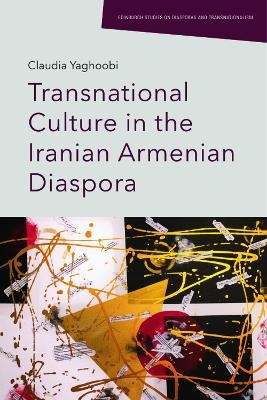
Transnational Culture in the Iranian Armenian Diaspora
Seiten
2023
Edinburgh University Press (Verlag)
978-1-3995-1237-4 (ISBN)
Edinburgh University Press (Verlag)
978-1-3995-1237-4 (ISBN)
Studies the ways that diasporic Iranian Armenian authors and artists negotiate their identities as minoritized population within a liminal space that includes religious, ethnic, national, racial, cultural, gender, and sexual factors.
Examines the ways diasporic Iranian Armenian authors and artists negotiate their identities in Iran and in the US
Highlights a defining characteristic of Iranian Armenian diaspora which concerns Armenians' ability to negotiate their identity within a codified legal hierarchy in Iran within a codified legal ethno-religious hierarchy and in the US via a legally codified racial hierarchy
Theorizes a concept specific to Iranian Armenian diaspora named verants'ughi (??????????) a transformational passageway
Studies a variety of literary works written in Persian, Armenian and English, as well as other cultural pieces in music, art and film
As an Iranian Armenian living in the US, the author includes first-hand life experiences as a minoritized member of Iranian Armenian population
Problematizes our understanding of concepts such as multiculturalism and transnationalism in Iran and in the U.S., comparatively.
Contributes to the broader topic of Iranian nationalism and the historical marginalization of Iranian minoritized populations, resulting in their global migration, but also examines multiculturalism and transnationalism within Iran.
Transnational Culture studies the ways that diasporic Iranian Armenian authors and artists negotiate their identities as minoritized population within a liminal space that includes religious, ethnic, national, racial, cultural, gender, and sexual factors. Yaghoobi argues that this liminal state of fluidity helps them to develop a resilience towards ambiguity and handling ambivalence in dealing with various cultures as well as resisting dualistic thinking. This in turn allows them to move beyond national boundaries to transnationalism, yet simultaneously display the collective Armenian identity characterized by flexibility, adaptability, and continuity as a result of both multiple uprooting and a Genocide that continues to this day. They serve as a bridge between the homeland and the host nation, occupying what the author theorizes as verants'ughi the transformational passageway, which requires them to not only risk being in a transitory space and give up the safe space of home and the power that comes with it, but also through doing so, they create transformative works of literature and art.
Examines the ways diasporic Iranian Armenian authors and artists negotiate their identities in Iran and in the US
Highlights a defining characteristic of Iranian Armenian diaspora which concerns Armenians' ability to negotiate their identity within a codified legal hierarchy in Iran within a codified legal ethno-religious hierarchy and in the US via a legally codified racial hierarchy
Theorizes a concept specific to Iranian Armenian diaspora named verants'ughi (??????????) a transformational passageway
Studies a variety of literary works written in Persian, Armenian and English, as well as other cultural pieces in music, art and film
As an Iranian Armenian living in the US, the author includes first-hand life experiences as a minoritized member of Iranian Armenian population
Problematizes our understanding of concepts such as multiculturalism and transnationalism in Iran and in the U.S., comparatively.
Contributes to the broader topic of Iranian nationalism and the historical marginalization of Iranian minoritized populations, resulting in their global migration, but also examines multiculturalism and transnationalism within Iran.
Transnational Culture studies the ways that diasporic Iranian Armenian authors and artists negotiate their identities as minoritized population within a liminal space that includes religious, ethnic, national, racial, cultural, gender, and sexual factors. Yaghoobi argues that this liminal state of fluidity helps them to develop a resilience towards ambiguity and handling ambivalence in dealing with various cultures as well as resisting dualistic thinking. This in turn allows them to move beyond national boundaries to transnationalism, yet simultaneously display the collective Armenian identity characterized by flexibility, adaptability, and continuity as a result of both multiple uprooting and a Genocide that continues to this day. They serve as a bridge between the homeland and the host nation, occupying what the author theorizes as verants'ughi the transformational passageway, which requires them to not only risk being in a transitory space and give up the safe space of home and the power that comes with it, but also through doing so, they create transformative works of literature and art.
Claudia Yaghoobi is a Roshan Institute Associate Professor and the director of the Center for the Middle East and Islamic Studies at the University of North Carolina, Chapel Hill. She is the author of Temporary Marriage in Iran: Gender and Body Politics in Modern Persian Literature and Film (Cambridge UP 2020) and Subjectivity in 'Attar, Persian Sufism, and European Mysticism (Purdue UP 2017). She is the editor of The #MeToo Movement in Iran: Reporting Sexual Violence and Harassment forthcoming from Bloomsbury/IB Tauris in 2023. She is co-editor with Janet Afary of the Sex, Marriage and Culture in the Middle East book series.
| Erscheinungsdatum | 02.05.2023 |
|---|---|
| Reihe/Serie | Edinburgh Studies on Diasporas and Transnationalism |
| Zusatzinfo | 4 B/W illustrations 11 colour illustrations 11 Colour illustrations, 4 Black & White |
| Verlagsort | Edinburgh |
| Sprache | englisch |
| Maße | 156 x 234 mm |
| Themenwelt | Geisteswissenschaften ► Geschichte ► Regional- / Ländergeschichte |
| Geisteswissenschaften ► Sprach- / Literaturwissenschaft ► Anglistik / Amerikanistik | |
| Geisteswissenschaften ► Sprach- / Literaturwissenschaft ► Literaturwissenschaft | |
| Sozialwissenschaften ► Ethnologie | |
| Sozialwissenschaften ► Soziologie | |
| ISBN-10 | 1-3995-1237-4 / 1399512374 |
| ISBN-13 | 978-1-3995-1237-4 / 9781399512374 |
| Zustand | Neuware |
| Haben Sie eine Frage zum Produkt? |
Mehr entdecken
aus dem Bereich
aus dem Bereich


